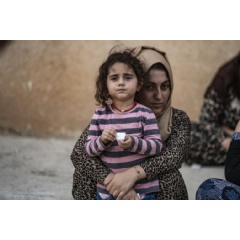Lack of funding leaves millions of children in conflict and disaster zones at risk
$4 billion humanitarian appeal nearly 50 per cent unfunded heading into final quarter of 2019
Millions of children living in areas affected by conflict and disaster are at risk because of substantial shortages in funding for lifesaving humanitarian programmes, UNICEF said today.
To date, UNICEF has only received 54 per cent of the US$4.16 billion needed to meet the basic health, education, nutrition and protection needs of 41 million children in 59 countries this year. Heading into the final quarter of 2019, the funding gap stands at 46 per cent.
“Millions of vulnerable children around the world are suffering the grievous consequences of increasingly complex humanitarian crises,” said UNICEF Executive Director Henrietta Fore. “Without additional resources, these children will not go to school, be vaccinated, receive adequate nutrition, or be protected from violence and abuse. While we continue to appeal for an end to conflicts and better readiness to emergencies, we need additional donor support to help us meet children’s most basic needs.”
Emergencies with the largest funding gaps include Pakistan (83 per cent), Cameroon (80 per cent), Burkina Faso (76 per cent) and Venezuela (73 per cent). Large-scale emergencies in Syria and neighboring countries, Yemen, Democratic Republic of the Congo and Bangladesh also remain significantly underfunded.
If these funding gaps persist through the end of the year, the consequences for children will be dire:
- In the Democratic Republic of the Congo, US$ 61 million is urgently required to provide essential services for communities in areas that have long suffered from humanitarian and security crises, and at the same time to create an environment conducive to an effective Ebola response.
- In Ethiopia, UNICEF needs more than US$43 million to provide children and families affected by drought and displacement with access to safe water, hygiene and sanitation.
- In Haiti, UNICEF requires nearly US$ 2 million to provide nutritional support to over 19,000 children in need of urgent nutrition assistance and US$ 2 million to support family reunification and care services for unaccompanied and separated children.
- In Libya, without US$ 540,000 in urgent funding, UNICEF will be unable to provide mine risk education for 50,000 children.
- In northeast Nigeria, nearly US$ 7 million in funding is urgently needed to sustain lifesaving nutrition programmes, including US$ 3.5 million to prevent a break in the supply pipeline of ready-to-use-therapeutic food for the treatment of severe acute malnutrition in children.
- In South Sudan, UNICEF child protection programmes are only 20 per cent funded while water, sanitation and hygiene programmes are 26 per cent funded.
- In Sudan, UNICEF needs US$ 12 million to continue lifesaving treatment for more than 61,000 children under five suffering from severe acute malnutrition.
- In Syria, where the funding gap is at US$ 30 million, 2.1 million children could miss out on critical formal and non-formal education activities.
- In Syria’s neighbouring countries (Turkey, Lebanon, Jordan, Iraq, Egypt), home to 2.5 million Syrian refugees, a funding gap of US$ 249 million means that 460,000 children could also miss out on education activities.
- In Venezuela, UNICEF requires at least US$ 6 million to help 60,000 children enroll and stay in school, through the provision of school feeding programmes. UNICEF also needs at least US$ 3 million to help vaccinate nearly 400,000 children against preventable diseases over the next three months.
- In West and Central Africa, UNICEF humanitarian assistance to support education for children in countries affected by emergencies are 72 per cent unfunded.
“During my time on the ground in countries under crisis – countries like DRC, Mozambique, South Sudan, Syria and Yemen – I’ve seen firsthand the power of humanitarian funding to change the lives of vulnerable children for the better,” said Fore. “With increased support, together we can reach even more of the children who need us most.”
###
UNICEF launched its 2019 global humanitarian appeal in January, asking for US$3.9 billion. Since then, and because of emerging or worsening crises in countries like Burkina Faso, Sudan, Venezuela and Zimbabwe, UNICEF’s humanitarian funding needs have climbed to US$4.16 billion. For more information, visit Humanitarian Action for Children 2019.
( Press Release Image: https://photos.webwire.com/prmedia/6/248920/248920-1.jpg )
WebWireID248920
This news content was configured by WebWire editorial staff. Linking is permitted.
News Release Distribution and Press Release Distribution Services Provided by WebWire.
